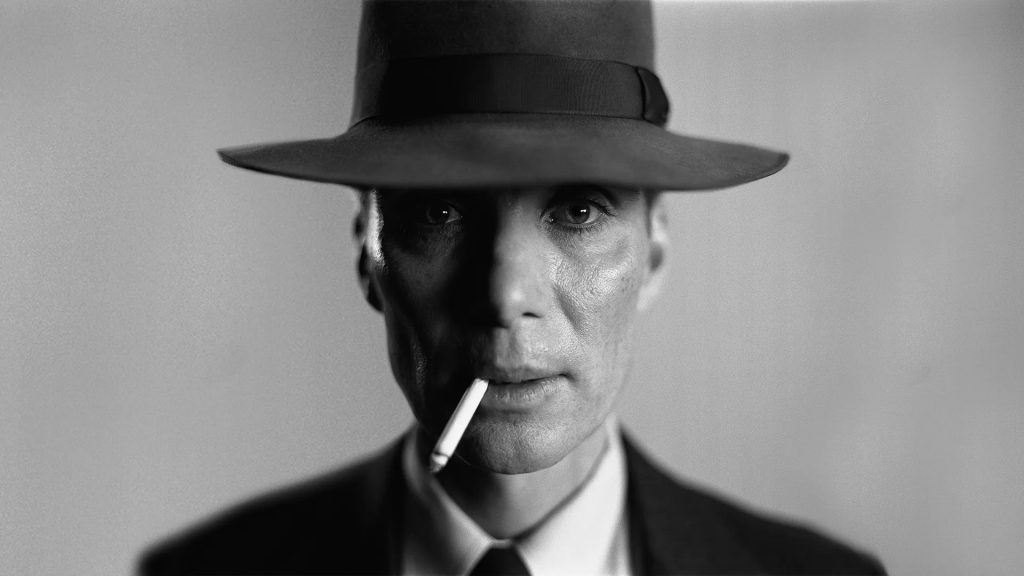Discovering nuclear fission’s potential destructive force during World War II, J. Robert Oppenheimer is tasked with the creation of the first atomic bomb. Cillian Murphy leads an all-star cast in this tense historical biopic.
Oppenheimer is known as, ‘The father of the atomic bomb’, the usage of which led to the end of World Word II with the bombing of Hiroshima and Nagasaki, Japan in August 1945. The devastation led to over 200,000 lives being lost through its immediate impact and the aftermath, but also left Oppenheimer with a profound psychological scar. “Now, I am become Death, the destroyer of worlds”, a Sanskrit by Bhagavad Gita, is the most famously quoted line from a brilliant but troubled man, who died just eight years after the 1959 Senate hearing that ultimately vilified him in the eyes of America, and indeed the world for decades.
Directed by Christopher Nolan, and filmed on glorious 70mm film, ‘Oppenheimer’ has solely been created ‘in camera’, using zero CGI, with every nuance Nolan wanting to achieve being created without the use of a computer (apart from compositing real elements together in post-production). From a seasoned director who favours non-linear narrative timeline, this 3-hour journey is divided primarily into two main points of view.
Firstly ‘Fission’, which is told from Oppenheimer’s perspective (Cillian Murphy), and filmed in colour. This mainly centers around his early studies and eventual deadly discovery, right up until the 1954 during a four-week hearing. Then within this timeline we see the ‘Fusion’ perspective of Lewis Strauss, with a class leading performance by Robert Downey Jr. In the 1959 U.S. Senate hearings filmed in black and white, we have the distinct break required to help deal with the onslaught of critical information over the challenging and ultimately devastating 34-year period.
Shying away from retelling the actual devastating effects of the atomic bomb, Nolan instead concentrates more on the mental anguish Oppenheimer puts himself and his immediate family through, as he visually appears ever more fraught and frail through his career. With the obvious horrific visuals – that are in this case quite beautiful – as a secondary tool, Nolan leans more toward a sort of ‘acoustic onslaught’, which frequently catches you off guard to a masterful degree that can only really be witnessed (and certainly heard) on an appropriate IMAX screen.
There’s a top-notch cast backing up Cillian Murphy, whose charismatic face could not be more perfectly used. With his piercing ice blue eyes lit up in the press’ camera flashes, through to the visual hollowness of the later years of continuous work and colleague deceit, we are once more delivered some of the finest talent working in the industry right now. Emily Blunt gives a slow-burn of a performance as Oppenheimer’s wife Kitty, fighting for his justice during and after the bombings. Blunt seems to have little to do in the film, before a brilliantly tense scene between her and Jason Clarke in the final act of the film, with Blunt virtually creating a fully realised character in a matter of minutes. Florence Pugh has sporadic scenes as Jean Tatlock, his American Communist mistress. Pugh does a fine job with what little screen time she has, and will probably be in the running for a best supporting actress nomination along with Blunt.
Matt Damon plays Lt. General Leslie Groves, the chief of security on the ‘Manhattan Project’, who is almost the physical and intellectual antithesis of Oppenheimer, and scenes between the two are always engaging. Even through to supporting roles with Kenneth Branagh as Niels Bohr, and Benny Safdie (Are You There God? It’s me, Margaret) as Edward Teller, an American Theoretical Physicist. Every turn gives us truly class-leading performances, and help weave a timeline tapestry that deftly shows the rise and fall of this, womanising, reckless, but sensitive man.
Whereas his last film, ‘Tenet’, was caught in the Covid-crossfire, leading to poor box office results… ‘Oppenheimer’ seems to be bringing the public back to cinemas in droves, especially for the rare thirty or so worldwide 70mm IMAX showings. Nolan has once more delivered an epic piece of cinema that arguably is slightly too long, yet certainly delivers on spectacle. Nolan is often criticised for writing scripts that are overly ‘clinical’, and the last hour of this film, although brilliantly acted, is informationally dense and can feel like something of an anti-climax after the tense build-up to the creation of the bomb. It will most certainly require multiple viewings to really take it all in, but Nolan seems to be putting aside (at least for now) the high-concept fictional leanings of previous films, and opting for something more grounded and mature.
Author: Piers, Maidstone Store







